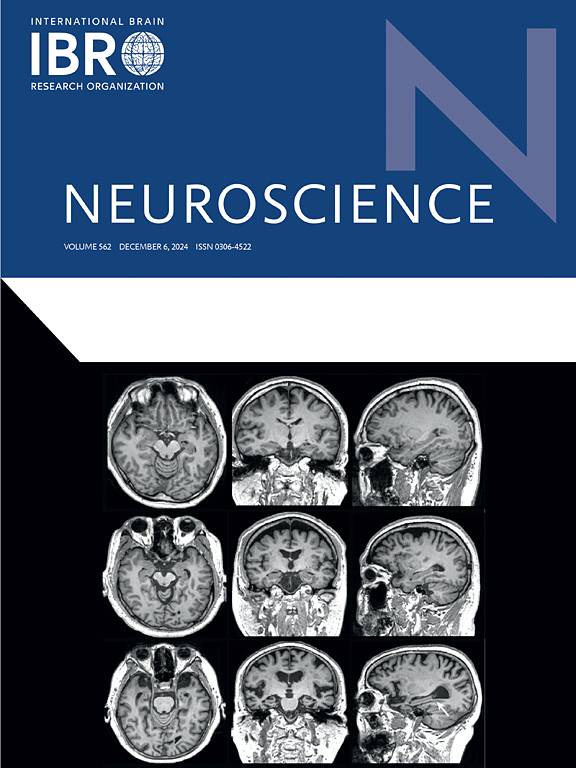Exploring the combined neuroprotective effects of resveratrol and hesperidin in a scopolamine-induced rat model of cognitive impairment
IF 2.8
3区 医学
Q2 NEUROSCIENCES
引用次数: 0
Abstract
The occurrence of cognitive impairment in normal aging and sporadic Alzheimer’s disease is linked to oxidative stress. Resveratrol, a polyphenolic molecule, and hesperidin, a flavanone glycoside have exhibited powerful anti-oxidant and neuroprotective effects. The present study was designed to explore the neurotherapeutic potential of combination between resveratrol and hesperidin as preventative herbal remedies to inhibit oxidative stress and cholinergic and mitochondrial dysfunction in scopolamine-induced cognitive impairments in rats. Resveratrol (20 mg/kg, p.o.), hesperidin (20 mg/kg, p.o.), and its combination were administered orally up to 21 days. Cognitive impairment was induced by intraperitoneal injection of scopolamine (1 mg/kg, i.p.) to rats for 5 days (15th, 16th, 17th, 18th, and 19th). Learning and memory function in rats were appraised by using the Morris water maze. Subsequently, the content of oxidative-nitrosative stress parameters, the activity of acetylcholinesterase (AChE), electron transport chain complexes, brain-derived neurotrophic factor (BDNF), and pro-inflammatory cytokines mediators (TNF-α and IL-6) in hippocampus brain areas of rats were measured. Scopolamine treatment significantly produced learning and memory impairment, oxidative-nitrosative stress, cholinergic dysfunction, mitochondrial deficit, reduced BDNF, and increased TNF-α and IL-6 levels. Whereas, resveratrol and hesperidin combination therapy effectively improved brain anti-oxidant status, lowered brain mitochondrial impairments, and neuro-inflammation in rats as compared to mono-therapy. Our findings demonstrated that the resveratrol and hesperidin combination group showed excellent anti-cognitive impairment properties compared to single therapy. The combination therapy exhibited a favorable effect in suppressing scopolamine-induced cognitive impairment, either additively, synergistically, or through distinct molecular pathways.
探索白藜芦醇和橙皮苷在东莨菪碱诱导的认知障碍大鼠模型中的联合神经保护作用
正常衰老和散发性阿尔茨海默病中认知障碍的发生与氧化应激有关。白藜芦醇(一种多酚分子)和橙皮苷(一种黄酮苷)显示出强大的抗氧化和神经保护作用。本研究旨在探讨白藜芦醇和橙皮苷联合作为预防性草药对东莨菪碱诱导的认知障碍大鼠氧化应激、胆碱能和线粒体功能障碍的神经治疗潜力。白藜芦醇(20 mg/kg, p.o.)、橙皮苷(20 mg/kg, p.o.)及其联合用药口服至21天。大鼠分别于第15、16、17、18、19天腹腔注射东莨菪碱(1 mg/kg, i.p)诱导认知功能障碍。采用Morris水迷宫评价大鼠的学习记忆功能。随后,测定大鼠海马区氧化-亚硝化应激参数、乙酰胆碱酯酶(AChE)、电子传递链复合物、脑源性神经营养因子(BDNF)和促炎细胞因子(TNF-α和IL-6)活性。东莨菪碱治疗显著导致学习和记忆障碍、氧化-亚硝化应激、胆碱能功能障碍、线粒体缺陷、BDNF降低、TNF-α和IL-6水平升高。然而,与单一治疗相比,白藜芦醇和橙皮苷联合治疗有效地改善了大鼠的脑抗氧化状态,降低了脑线粒体损伤和神经炎症。我们的研究结果表明,与单一治疗相比,白藜芦醇和橙皮苷联合治疗组表现出良好的抗认知障碍特性。联合治疗在抑制东莨菪碱诱导的认知障碍方面表现出良好的效果,无论是加性的,协同的,还是通过不同的分子途径。
本文章由计算机程序翻译,如有差异,请以英文原文为准。
求助全文
约1分钟内获得全文
求助全文
来源期刊

Neuroscience
医学-神经科学
CiteScore
6.20
自引率
0.00%
发文量
394
审稿时长
52 days
期刊介绍:
Neuroscience publishes papers describing the results of original research on any aspect of the scientific study of the nervous system. Any paper, however short, will be considered for publication provided that it reports significant, new and carefully confirmed findings with full experimental details.
 求助内容:
求助内容: 应助结果提醒方式:
应助结果提醒方式:


